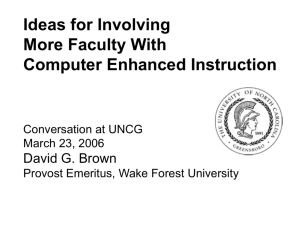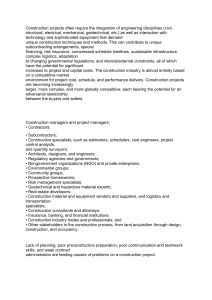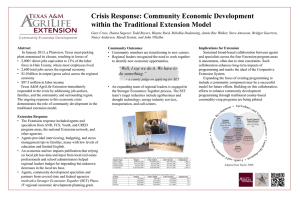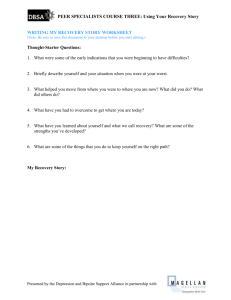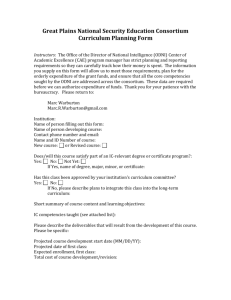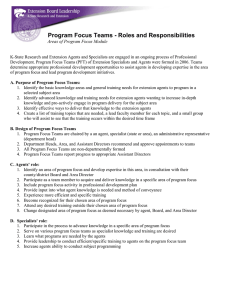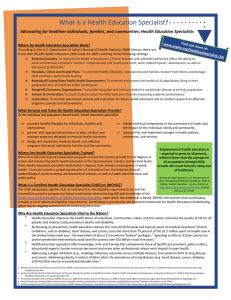PROGRAM EVALUATION RESEARCH AND SUPPORT WORKING GROUP 2008 OUTPUTS OUTCOMES – IMPACT
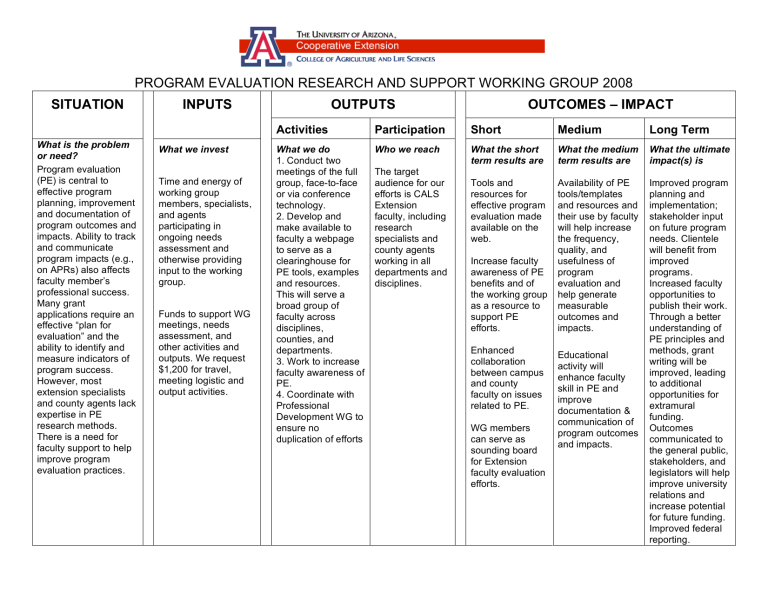
SITUATION
PROGRAM EVALUATION RESEARCH AND SUPPORT WORKING GROUP 2008
INPUTS OUTPUTS OUTCOMES – IMPACT
What is the problem or need?
Program evaluation
(PE) is central to effective program planning, improvement and documentation of program outcomes and impacts. Ability to track and communicate program impacts (e.g., on APRs) also affects faculty member’s professional success.
Many grant applications require an effective “plan for evaluation” and the ability to identify and measure indicators of program success.
However, most extension specialists and county agents lack expertise in PE research methods.
There is a need for faculty support to help improve program evaluation practices.
What we invest
Time and energy of working group members, specialists, and agents participating in ongoing needs assessment and otherwise providing input to the working group.
Funds to support WG meetings, needs assessment, and other activities and outputs. We request
$1,200 for travel, meeting logistic and output activities.
Activities Participation Short
What we do
1. Conduct two meetings of the full group, face-to-face or via conference technology.
2. Develop and make available to faculty a webpage to serve as a clearinghouse for
PE tools, examples and resources.
This will serve a broad group of faculty across disciplines, counties, and departments.
3. Work to increase faculty awareness of
PE.
4. Coordinate with
Professional
Development WG to ensure no duplication of efforts
Who we reach
The target audience for our efforts is CALS
Extension faculty, including research specialists and county agents working in all departments and disciplines.
Medium
What the short term results are
Tools and resources for effective program evaluation made available on the web.
Increase faculty awareness of PE benefits and of the working group as a resource to support PE efforts.
Enhanced collaboration between campus and county faculty on issues related to PE.
WG members can serve as sounding board for Extension faculty evaluation efforts.
What the medium term results are
Availability of PE tools/templates and resources and their use by faculty will help increase the frequency, quality, and usefulness of program evaluation and help generate measurable outcomes and impacts.
Educational activity will enhance faculty skill in PE and improve documentation & communication of program outcomes and impacts.
Long Term
What the ultimate impact(s) is
Improved program planning and implementation; stakeholder input on future program needs. Clientele will benefit from improved programs.
Increased faculty opportunities to publish their work.
Through a better understanding of
PE principles and methods, grant writing will be improved, leading to additional opportunities for extramural funding.
Outcomes communicated to the general public, stakeholders, and legislators will help improve university relations and increase potential for future funding.
Improved federal reporting.
Assumptions: (Beliefs, expectations, and principles that guide our work.)
1. Program evaluation is central to effective program planning, program improvement, input from stakeholders, and documentation of program outcomes.
2. Extension Specialists and county agents are generally subject experts and often have little training in program evaluation methodology.
3. There is considerable variation among faculty in the frequency and quality of program evaluation efforts.
4. A faculty program evaluation needs assessment conducted in 2007 determined that 53% of faculty feel it is “very important” to improve their program evaluation skills, and provided input on training and resource preference.
5. Faculty and ultimately our clientele could benefit from some basic information, tools, and resources that would provide a framework for evaluating programs.
5. Tools and resources should be developed with input from extension specialists and agents to ensure that they are useful, practical, and meet the needs of program implementers.
Environment: (Influential factors)
1. Time and financial resources dedicated to various program evaluation methods have to come from somewhere; one concern of faculty is that resources dedicated to evaluating programs are deducted from the resources to develop and deliver programs.
2. Specialists and agents must be willing to participate in the process (providing input on their needs and making use of any resources that are developed).
